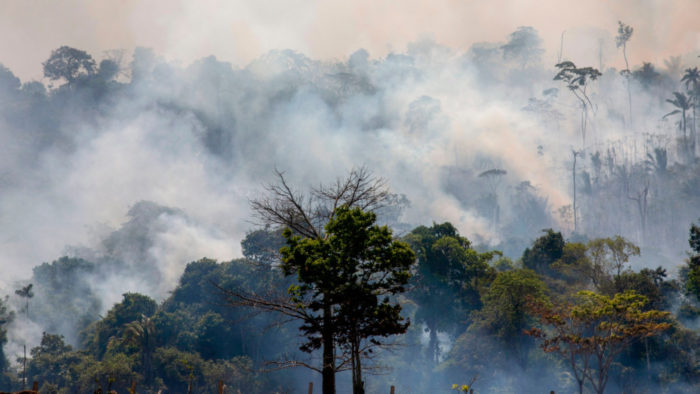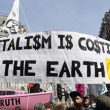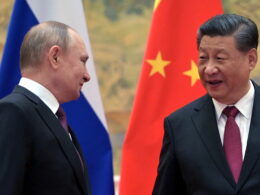By James McCabe
“At first I thought I was fighting to save the rubber trees. Then I thought I was fighting to save the Amazon rainforest. Now I realise I am fighting for humanity.” Brazilian trade union leader and environmentalist, Chico Mendes who was assassinated by a cattle rancher in 1988.
A planetary problem
The words of Chico Mendes ring true today, as the unprecedented fires scorching the Amazon have sparked worldwide outrage. This rainforest is home to 30% of the world’s species and contains an ecosystem of 400 billion trees and vegetation so dense and heavy with water it exhales a fifth of the world’s oxygen.
The forest deflects and consumes a significant amount of solar heat, and stores between 90-140 billion tonnes of carbon. Therefore, the destruction of this forest is an enormous contributor to the accelerating climate catastrophe.
In the past half century, a fifth of this rainforest has been cut or burned in Brazil, whose borders contain two-thirds of the Amazon basin. This process grew rapidly under the military dictatorship in the 1960s and 70s. The ambitions of this regime were described by one of the generals who led the dictatorship, Castelo Branco: “Amazonian occupation will proceed as though we are waging a strategically conducted war.”
Aggressive Agribusiness
The current president of Brazil, Jair Bolsonaro, often nostalgically celebrates the military dictatorship and wants to eliminate environmental protections and regulations. He has encouraged the big cattle ranchers and corporations to illegally cut and burn the forest. The Intercept magazine recently interviewed Dilermando Melo de Lima, president of the major ranchers’ association in the westernmost Brazilian state of Acre, who argued: “There are too many restrictions and laws. Too many protected areas. The forest is going to be cut anyway. The military regime was good for development. Bolsonaro has the same ideas, and the ranchers are betting everything on his success.”
Bolsonaro has certainly emboldened the ranchers, as there has been an 84% increase in forest fires over the past year. The president also has plans to build many more roads and ports in the Amazon region in order to speed up the process of deforestation. A project made feasible by international financing.
Beef production has been responsible for as much as 65% of rainforest destruction across the globe over the past twenty years. The EU Commission is pursuing a trade deal that will lead to 99,000 tonnes of South American beef being imported into the EU market every year. If passed, this will have major implications for the future of the Amazon.
Soybean crops
The other major farming industry that is encroaching on the rainforest is the production of soybeans. The unparalleled biodiversity of the Amazon is made possible by the nutrients provided by the constant decomposition of its bountiful vegetation, not the thin layers of soil beneath the forest floor. Take away this vegetation, and the region’s topsoil dries and depletes quickly, requiring expensive systems of short-term life support and the constant creation of new land.
Most soybean crops that are planted last for only one or two years as the soil is robbed of its natural source of nutrients, requiring farmers and corporations to abandon the land in search of more land if they are to make a profit. What a rotten example of the wastage and short-term outlook that capitalist competition generates in its blind search for profits.
The damage done so far has led to the desertification of the former rainforest in many areas. The rainy season has already got much shorter and warmer. At the rate that the farming, mining and logging corporations are felling the rainforest, another 20% of the Amazon could be destroyed within a much shorter time frame than the last fifth was.
Is it too late?
The strikes and direct actions of Chico Mendes and his coalition of indigenous people and other forest dwellers in the 1980s and 1990s, forced the government to establish environmental protections. This actually led to a decrease in deforestation in the 2000s. However, any gains made in the fight against corporations and banks will be resisted unless power is taken out of the hands of the capitalist class.
The economic downturn in Brazil in 2014 led directly to increased pressure on the Amazon, in order to privatise and exploit the land in the name of profitability. The Pastoral Land Commission has recorded more than 600 land-related murders in the last 15 years, with a 20% increase in 2018. And this was before Bolsonaro came to power.
The general strike by 45 million workers that paralysed Brazil’s cities back in June shows the limits of Bolsonaro’s agenda when confronted by the power of the working class. The working class and oppressed in Brazil need to arm themselves with a socialist programme. Breaking with capitalism and planning the economy for our planet and human need would mean the immediate end to deforestation, along with a plan of mass reforestation to restore the lungs of the Earth.












